Hashem Abedi trial: Manchester Arena bomber's brother 'just as responsible' for terror attack that killed 22
Court hears that Mr Abedi assisted his brother towards 'shared goal' of killing and maiming as many people as possible

Hashem Abedi is “just as responsible” for the Manchester Arena bombing as his brother after helping build the device that killed 22 people, a court has heard.
Prosecutors said that although Salman Abedi blew himself up amid young Ariana Grande fans flooding out of a concert in May 2017, his brother was just as guilty “as if he had selected the target and detonated the bomb himself”.
Duncan Penny QC told the Old Bailey that the explosion was the “culmination of months of planning, experimentation and preparation by the two of them”.
“This defendant is just as guilty of the murder of the 22 people killed as was his brother,” he said. “He is equally guilty of the attempted murder of many others and, in doing so, he was guilty of agreeing with his brother to cause an explosion or explosions of a nature likely to endanger life.”
The court heard heard that as well as the 22 people who died, including several teenagers, police had identified almost 1,000 other victims. Of those, 273 people were physically injured and 670 have reported psychological trauma following the explosion.
Mr Penny said the bombing was a “shared goal” of the two brothers, although it would be Salman Abedi who detonated the device.
He told the jury that both men had obtained precursor chemicals for the improvised explosive device (IED), and had then attempted to distance themselves from the purchases by using fake identifies and other people’s bank details.
The prosecutor said Mr Abedi “obtained and experimented with” metal containers for constructing an IED, fashioned improvised cylinders to be used as detonators and obtained a property in outer Manchester in which the bomb could be manufactured and stored.
The 22-year-old was allegedly involved in the purchase of screws and nails to “kill, maim and injured as many people as possible in the detonation”.
Mr Penny said that shortly before the brothers returned to Libya in April 2017, Mr Abedi purchased a Nissan Micra that was used by the pair as a storage facility for their bomb-making equipment.
“This body of evidence suggests that the defendant in this case, the surviving brother, is just as responsible for the crimes which resulted in so much death, injury and damage following the detonation of the bomb on 22 May 2017,” he added.
“The law is that Hashem Abedi is just as responsible for this atrocity and for the offences identified in the indictment, just as surely as if he had selected the target and detonated the bomb himself.”
Mr Abedi appeared in the dock wearing a dark blue shirt and glasses, watched by survivors of the bombing and relatives of the victims, while others attended a broadcast of proceedings in Manchester.

The court heard that Mr Abedi, who denies all charges, had asked the owner of a Stockport takeaway where he worked if he could take home empty vegetable oil cans. He allegedly claimed that he was planning to sell them for scrap but modified the metal into a container and six small cylinders.
Mr Penny said forensic examination showed that a scrap of metal found at the scene of the bombing was from the same can cut up by Mr Abedi.
The jury was told that the container was found at the brothers’ family home in Fallowfield, while the cylinders had been with Salman Abedi in the Granby Row flat where he assembled the bomb up until the evening of the attack.
Mr Penny said the bomb was not contained in a vegetable oil can but “ the device ultimately used was not the brothers’ first attempt at construction” and the items collected by Mr Abedi played a pivotal role.
He allegedly helped acquire chemicals used to make the highly sensitive explosive TATP, as well as large bags of nails and screws for shrapnel.
The jury heard that between January and April 2017, Mr Abedi “gave untruthful explanations” to associates in order to use their online shopping accounts and addresses to obtain sulphuric acid and hydrogen peroxide.
In January 2017 he had been due to travel to Germany but texted an associate saying he had “some problems” and was unable to leave Manchester.
The following month, the brothers rented a flat in the Blackley area of north Manchester, which they allegedly used to store chemicals and manufacture explosives.

Mr Penny said they chose the area because it was miles from family or friends who would recognise them, meaning they could “operate without unwanted or uninvited interruption”.
The prosecutor told jurors that after the bombing police had found Mr Abedi’s fingerprints inside the flat alongside traces of TATP.
The court heard that Mr Abedi also bought a Toyota Aygo that was insured fraudulently in his eldest brother’s name and used to drive between the different properties.
During the period, the court heard that the brothers both changed their mobile phone numbers frequently, switching between different sim cards and handsets. They were living alone at the family home after their parents, originally from Libya, returned to the country in 2016.
“In the years leading up to the bombing, the brothers had begun to display some signs of radicalisation, Salman more than Hashem,” Mr Penny said.
He told the jury a male relative recalled a conversation as he travelled with the brothers in a car during which Salman “spoke of jihad” and told him: “Do chemistry so you can build a bomb.”
“All of this was said in he presence of this defendant, who later told police he had no inkling of the radicalisation of his brother and believed that Salman required the acid for family reasons rather than for the purpose of terrorism,” Mr Penny said.
Mr Abedi, originally from Manchester, denies 22 counts of murder, attempted murder and conspiring with his brother to cause explosions.
The trial continues.
